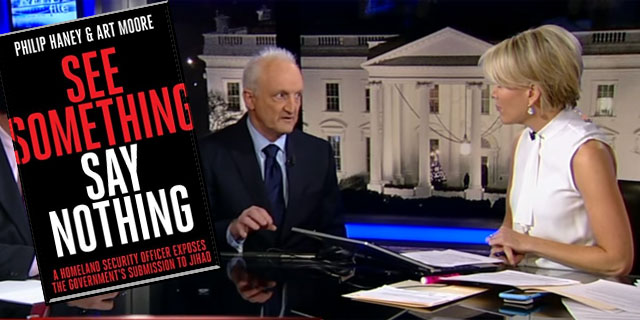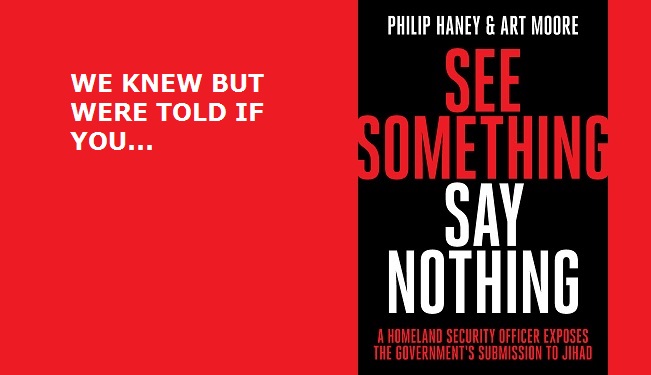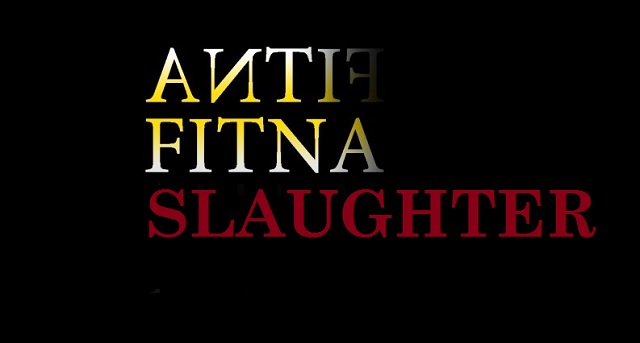
The very fact that you are not a Muslim, and don’t want to be, after being called upon [Dawah], makes you unjust and [an] oppressor. This is called Fitnah, and Fitnah is worse than killing. Whenever you criticize Islam on the Net, you are committing Fitnah. Therefore, you are worse than a murderer, and your blood is Halal [Permissible].
A little more than a year ago, I wrote about the subject of Fitnah from an Islamic theological perspective, while pointing out that Fitnah is the Quranic phrase for what has been dubbed Islamophobia in the non-Islamic world.
This time, I would like to discuss the same subject, but from a more secular-political perspective. In other words, does the potent Quranic concept that Fitnah is worse than slaughter, have any application in the secular-political world outside of predominantly Islamic countries?
As you will see, the answer is, plainly, Yes. After reviewing the earlier article on Fitnah, you’ll also see that the bottom line, theologically, is that the serious moral crime of refusing to accept Islam (= Fitnah), is much greater than any possible moral crime involved in the slaughtering (or plundering) of non-Muslims for their unbelief.
Is this counter-intuitive to the non-Islamic (Western) mind? Absolutely. ‘That’s a pretty stark statement,’ you’ll say. Agreed, but it is nonetheless true, as attested by Islamic scholars clear back to the founding of Islam, more than 1,400 years ago. From the very beginning, Mohammed set the example of killing people for the crime of Fitnah, and his example has been followed ever since, often with unfathomable enthusiasm.
For our first example of what Fitnah is worse than slaughter looks like from a non-Islamic perspective (and why it is so important to recognize), let’s examine how the multi-generational theological conflict between Sunni and Shia Islam is described in the non-Islamic media.
In this particular event, the Sunni side was represented by Saudi Arabia, while the Shia side was represented by Iran. On January 20, 2016, the Tribune reported that Saudi Arabia had accused Iran of a nearly four-decade* record of “sedition, unrest and chaos,” and, as the international community tried to calm tensions between the regional rivals, tensions between Saudi Arabia and Iran had reached a new high, when Riyadh and a number of its Arab allies cut diplomatic ties with Tehran.
*That is, since the 1979 Iranian Revolution.
In turn, Iran responded to the Saudi accusations by saying, “Some in Riyadh not only continue to impede normalisation, but are determined to drag the entire region into confrontation,” and that the Saudi kingdom was “driven by fear that its contrived Iranophobia was crumbling,” and “seems to fear that the removal of the smoke screen of the nuclear issue will expose the real global threat: its active sponsorship of violent extremism.”
Meanwhile, if we look deep inside this smokescreen of secular-political language, we’ll find a cup of hot, concentrated Fitnah, without any sugar.
How so? Because in Arabic, the word for “sedition, unrest and chaos,” as well as for “active sponsorship of violent extremism,” is Fitnah.
In fact, both sides are accusing the other of Fitnah, which, as we’ve already seen, is considered a serious crime, that is, a capital offense. In other words, it is a volatile accusation that can easily erupt into violence and war (which has happened, many times, in the past).
The irony of it all is as thick as cold maple syrup, because Iran and Saudi Arabia are not only accusing each other of exactly the same thing (Fitnah), but are also blinded to the 1,400 year-old cycle of violence they are both trapped in.
Of course, for simply pointing this out (yes, even if it’s true), I am also guilty of Fitnah.
Now, let’s shift gears from the Middle East, and take a look at a few examples of how the Quranic concept that Fitnah is worse than slaughter has found increasingly frequent expression in the secular-political (non-Islamic) world, i.e., in the West.
Once again, we have to keep in mind that in the secular-political (non-Islamic) world, Islamophobia has become the semantic equivalent of Fitnah. Thus, it follows that any form of Islamophobia (i.e., anything seen as critical of Islam, even if it’s true), is now considered a greater threat to the social order, than the acts of violence (either political or actual) that are committed by the followers of Islam.
Why is this important to understand? Because in real time, macro domestic- and foreign policies are being built on this concept. As the following examples will show, we are being subtly coerced (and/or not-so-subtly forced) to submit to this unconstitutional, emerging global social order, on a near-daily basis.
To begin, on June 23, 2015, the Center for Security Policy published the results of a survey on levels of support for Shariah law and Jihad among Muslims in America. The survey revealed that nearly a quarter of the Muslims polled believed, “It is legitimate to use violence to punish those who give offense to Islam by, for example, portraying the prophet Mohammed,” and that nearly one-fifth of Muslims in America said that the use of violence was justified in order to make Shariah the law of the land in this country.
As may be expected, the survey was widely criticized when it was released, and is still being criticized to this very day. In fact, on March 17, 2016, the NY Times revealed that Frank Gaffney, Founder and President the Center for Security Policy, was part of a “high profile” coalition of experts that would be offering Senator Ted Cruz advice on foreign policy.
In response, the author of the NY Times article stated that “Mr. Cruz is utilizing the same expert that Mr. Trump cited when proposing a moratorium on Muslim immigration last year. Mr. Trump pointed to a Center for Security Policy poll that found a quarter of all Muslims thought that violence against Americans in the United States is justified as a part of global jihad. He was criticized at the time for justifying a controversial policy with a dubious survey.”
However, the survey is neither dubious, or deeply flawed, nor Islamophobic. As I so carefully pointed out in my July 17, 2015 article entitled In Defense of The Center for Security Policy 2015 Poll on American Muslims, “An analysis of 21 surveys conducted over a 10-year period reveals that the spectrum of opinions within the American Muslim community on Shariah law and the use of violence either to punish the enemies of Islam, or to make Shariah the law of the land, are exactly the same as the spectrum of opinions held by Muslims in the rest of the world.
I also added that, “Muslims in America are not an anomaly within the greater Islamic community (Ummah), nor do they depart significantly from the beliefs on Shariah and/or Jihad that are held by Muslims in the rest of the Islamic world. In other words, the CSP survey not only represents the views of Muslims nationwide, but globally as well.”
So, what does this all have to do with Fitnah being worse than slaughter? Evidently, it is now seen a much greater social-political crime (= Fitnah) to have the audacity to publish actual facts about the attitudes and beliefs of Muslims in America (and the world), than it is to (politically) slaughter those who simply point out that a significant portion of U.S. Muslims support the implementation of Shariah law, and the use of violence (Jihad) to do it.
To cite another example of Fitnah being worse than slaughter, on June 21, 2015, Juan Cole wrote an article entitled European Islamophobic Networks influenced Roof to Kill in Charleston.
In the article, Mr. Cole stated, “The Muslim-hatred of the Geert Wilders and Marine LePens in Europe, for which Daniel Pipes, and Pamela Geller, and the whole Islamophobic network are cheerleaders and enablers, was a key influence on Dylann Roof, according to his manifesto. These same hatemongers helped whip Norwegian white supremacist and terrorist Anders Brevik into a homicidal fever pitch in July of 2011, when he killed 77 Norwegians for allegedly being soft on Muslims.”
Dylann Roof killed nine African American Christians (not Muslims), while Anders Behring Brevik killed eight people (not Muslims) with a car bomb, then another 69 young people (not Muslims) at a Workers’ Youth League campground. Despite this, from a social-political perspective, Mr. Cole is slaughtering these European and American “hatemongers” and “Islamophobes,” by emphatically (and publicly) insisting that their intolerable “anti-immigrant, anti-Arab and anti-Muslim rhetoric” is directly responsible for pressure (Fitnah) within the disenfranchised Islamic community.
Three days after Mr. Cole’s article was published, we saw another horrifying example of Fitnah is worse than slaughter, when it was revealed that police in the U.K had known for five years that grooming gangs had targeted hundreds of Birmingham schoolgirls, all the while choosing not to alert the public.
In addition to highlighting the CSE [Child Sexual Exploitation] problem, the 120-page report, entitled Problem Profile: Operation Protection, which was made public only after a Freedom of Information request, added that “The predominant offender profile of Pakistani Muslim males…combined with the predominant victim profile of white females has the potential to cause significant community tensions. There is a potential for a backlash against the vast majority of law abiding citizens from Asian/Pakistani communities from other members of the community believing their children have been exploited. These factors, combined with an EDL [English Defense League] protest in Dudley in April [2010] and a general election in May could notably increase community tension.”
In other words, since revealing the truth about the CSE problem in Birmingham would have caused “community tensions” (Fitnah) and “backlash against law abiding citizens from the Asian/Pakistani communities,” the police chose instead to keep it secret. In doing so, they slaughtered (at least in a social-political sense), the lives of hundreds of young girls (and boys). Or, as calculated by the Birmingham police department, the Fitnah would have been greater than the slaughter.
To continue, we can also find an example of Fitnah is worse than slaughter in a very recent political event. On March 12, 2016, protesters managed to shut down Donald Trump’s Campaign event in Chicago. As reported in Progress Illinois, the mass protests held against Donald Trump in Chicago late Friday…forced the GOP presidential frontrunner to cancel his planned campaign event at the UIC Pavilion for safety reasons.
Then, after initially declining to criticize Donald Trump’s rhetoric toward the protesters at his rallies, all three of his rivals for the Republican presidential nomination, including Sen. Marco Rubio (R-FL), Sen. Ted Cruz (R-TX) and Gov. John Kasich (R-OH), implied (in carefully qualified statements), that Mr. Trump was at least partly responsible for the outbreaks of violence at his meetings.
Ironically, perhaps their consensus viewpoint was best summed up by Mr. Kasich, whose scheduled MSNBC town hall was also pre-empted by the chaos, when he issued a statement pinning the blame on Mr. Trump himself. “Tonight the seeds of division that Donald Trump has been sowing this whole campaign finally bore fruit, and it was ugly. Some let their opposition to his views slip beyond protest into violence, but we can never let that happen.”
Thus, according to his Republican rivals (not to mention his fiercely implacable Progressive Leftist opponents), it appears that Donald Trump is being held directly responsible for causing Fitnah, right here in America(!), as he campaigns to become President.
Moreover, rather than issuing forceful condemnations of the orchestrated political violence, it appears that Mr. Trump’s socio-political adversaries are more than willing to disregard the courtesies and protections provided by our Founding Fathers in the First Amendment, as they seek to slaughter (i.e., shut down and/or co-opt) the freedoms of expression that our forbears built into the American political process.
At this point, I’m sure the reader could easily cite other examples of how the malevolent Quranic concept of Fitnah is worse than slaughter has already diffused its way into the West (including America), so I will close with a final observation, derived from a recent interview that President Obama gave in the April 2016 issue of the Atlantic Magazine.
During the lengthy (and revealing) conversation, which is entitled, The Obama Doctrine, Unplugged, we learned that Obama believes that a “misplaced word, or a frightened look, or an ill-considered hyperbolic claim, could tip the country into panic,” the sort of panic that would “manifest itself in anti-Muslim xenophobia or in a challenge to American openness and to the constitutional order.”
In addition, we were informed that “Those who speak with Obama about jihadist thought say that he possesses a no-illusions understanding of the forces that drive apocalyptic violence among radical Muslims, but he has been careful about articulating that publicly, out of concern that he will exacerbate anti-Muslim xenophobia.”
This, my friends is a perfect summary of the Quranic concept of Fitnah is worse than slaughter. In his own words, our president tells us that he is less concerned about honestly addressing the threat of Jihad and slaughter, than he is about exacerbating any simmering anti-Muslim xenophobia, which is just a secular-political way of describing Fitnah.
Mr. President, some of us are no longer children, tossed to and fro, and carried about with every wind of doctrine, by the trickery of men. Some of us are also very aware that there is a growing threat in this world we live in, and that it has a name.
Pretending that it somehow doesn’t exist, or calling by some other name (xenophobia), or blaming us for being concerned, is not what we elected you to do.
In conclusion, the antidote to the rising political violence and threat of impending class warfare that we keep hearing about is, was, and always will be, Freedom of Speech.
Freedom of Speech is the bubbling peroxide that keeps the wounds of our political disagreements from becoming infected.
In the old days, it was “Come one, come all! Step right up, and have your say!” This invitation included the all-American pledge that I will listen to whatever you have to say (even if I don’t like it), and that you will listen to whatever I have to say (even if you don’t like it).
Today, things are different, and we are faced with uncertainty about the future of our beloved Republic.
If we lose our way, and allow this liberating socio-political contract to be destroyed, then we will inevitably see something like Quran 2.191 play out right in front of us, as our own countrymen become violently animated by the belief that Fitnah is worse than slaughter, as they forcefully insist that the use of intimidation and violence for political gain should override the will of the people, and the Constitution itself.
Believe me, I hope I’m wrong, and I’ll do my part to help keep this from ever happening in America.
However, even in these modern, secular times, it is still true that, Every kingdom that is divided against itself will be destroyed, and every house and city that is divided against itself will not stand.
It is also still true that, No one can serve two masters. For you will hate one and love the other; you will be devoted to one and despise the other.
In Venatus Veritas – In Relentless Pursuit of the Truth
RELATED ARTICLES:
U.S., UN-Backed #CVESymposium Exposes Farce of ‘Countering Violent Extremism’ Programs
BEWARE ‘DEMOCRACY SPRING’: The proper response to the left’s violent provocations must be zero tolerance
Press Briefing by Press Secretary Josh Earnest, 2/29/2016 on Muslim “slaughter”
U.S., UK governments knew where girls kidnapped by Boko Haram were, but no one tried to rescue them
 Investigations into Islamist movements like the Tablighi Jamaat and Muslim Brotherhood were stopped by the federal government in the name of religious liberties.
Investigations into Islamist movements like the Tablighi Jamaat and Muslim Brotherhood were stopped by the federal government in the name of religious liberties. The hard work of the investigations was not only stopped; it was thrown out. Haney was ordered to delete over 800 records related to Islamist extremists.
The hard work of the investigations was not only stopped; it was thrown out. Haney was ordered to delete over 800 records related to Islamist extremists. The deleted files may have prevented the “underwear” bomb plot, the Boston bombings and the San Bernardino attacks.
The deleted files may have prevented the “underwear” bomb plot, the Boston bombings and the San Bernardino attacks. When one of their own acclaimed experts offered to explain Islamism and its networks, the higher-ups didn’t even reply.
When one of their own acclaimed experts offered to explain Islamism and its networks, the higher-ups didn’t even reply. DHS even rejected the FBI’s request to use him for investigating a Muslim Brotherhood front.
DHS even rejected the FBI’s request to use him for investigating a Muslim Brotherhood front. Senior officials intervened to let Islamists fly into the U.S. against the advice of their own personnel.
Senior officials intervened to let Islamists fly into the U.S. against the advice of their own personnel. Six individuals affiliated with Muslim Brotherhood fronts helped craft the Obama Administration’s Countering Violent Extremism approach to counter-terrorism.
Six individuals affiliated with Muslim Brotherhood fronts helped craft the Obama Administration’s Countering Violent Extremism approach to counter-terrorism. Haney documented over 50 meetings between members of the executive and legislative branches and members of organizations identified by the U.S. government as Muslim Brotherhood fronts between 1998 and 2009.
Haney documented over 50 meetings between members of the executive and legislative branches and members of organizations identified by the U.S. government as Muslim Brotherhood fronts between 1998 and 2009. Islamist political pressure and lawfare works.
Islamist political pressure and lawfare works. Haney was repeatedly disciplined and investigated for his approach in tackling Islamic extremism, which took on the Islamist ideology as well as the results of that ideology. He was exonerated each time.
Haney was repeatedly disciplined and investigated for his approach in tackling Islamic extremism, which took on the Islamist ideology as well as the results of that ideology. He was exonerated each time. Ryan Mauro is ClarionProject.org’s national security analyst, a fellow with Clarion Project and an adjunct professor of homeland security. Mauro is frequently interviewed on top-tier television and radio. Read more, contact or arrange a speaking engagement.
Ryan Mauro is ClarionProject.org’s national security analyst, a fellow with Clarion Project and an adjunct professor of homeland security. Mauro is frequently interviewed on top-tier television and radio. Read more, contact or arrange a speaking engagement.



